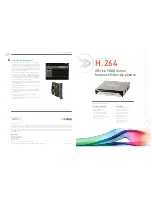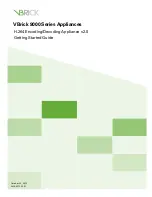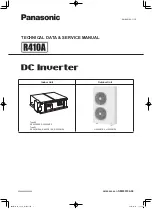
84
FTX-N/U, FVXS-N, FDMQ-R Series EDUS091558E
3P572321-1A
2
• Make sure that a separate power supply circuit is provided
for this unit and that all electrical work is carried out by
qualified personnel according to local, state, and national
regulations. An insufficient power supply capacity or
improper electrical construction may lead to electric shock
or fire.
• Make sure that all wiring is secured, that specified wires are
used, and that no external forces act on the terminal
connections or wires. Improper connections or installation
may result in fire.
• When wiring, position the wires so that the electrical wiring
box cover can be securely fastened. Improper positioning of
the electrical wiring box cover may result in electric shock,
fire, or the terminals overheating.
• Before touching electrical parts, turn off the unit.
• The circuit must be protected with safety devices in
accordance with local and national codes, i.e. a circuit
breaker.
• Securely fasten the outdoor unit terminal cover (panel). If the
terminal cover/panel is not installed properly, dust or water
may enter the outdoor unit causing fire or electric shock.
• When installing or relocating the system, keep the
refrigerant circuit free from substances other than the
specified refrigerant (R410A) such as air. Any presence of
air or other foreign substance in the refrigerant circuit can
cause an abnormal pressure rise or rupture, resulting in
injury.
• Do not change the setting of the protection devices. If the
pressure switch, thermal switch, or other protection device is
shorted and operated forcibly, or parts other than those
specified by Daikin are used, fire or explosion may occur.
CAUTION
• Do not touch the switch with wet fingers. Touching a switch
with wet fingers can cause electric shock.
• Do not allow children to play on or around the unit to prevent
injury.
• The heat exchanger fins are sharp enough to cut. To avoid
injury wear gloves or cover the fins while working around
them.
• Do not touch the refrigerant pipes during and immediately
after operation as the refrigerant pipes may be hot or cold,
depending on the condition of the refrigerant flowing through
the refrigerant piping, compressor, and other refrigerant
cycle parts. Your hands may suffer burns or frostbite if you
touch the refrigerant pipes. To avoid injury, give the pipes
time to return to normal temperature or, if you must touch
them, be sure to wear proper gloves.
• Install drain piping to ensure proper drainage. Improper
drain piping may result in water leakage and property
damage.
• Insulate piping to prevent condensation.
• Be careful when transporting the product.
• Do not turn off the power immediately after stopping
operation. Always wait for at least 5 minutes before turning
off the power. Otherwise, water leakage may occur.
• Do not use a charging cylinder. Using a charging cylinder
may cause the refrigerant to deteriorate.
• Refrigerant R410A in the system must be kept clean, dry,
and tight.
(a) Clean and Dry -- Foreign materials (including mineral oils
such as SUNISO oil or moisture) should be prevented
from getting into the system.
(b) Tight -- R410A does not contain any chlorine, does not
destroy the ozone layer, and does not reduce the earth’s
protection again harmful ultraviolet radiation. R410A can
contribute to the greenhouse effect if it is released.
Therefore take proper measures to check for the tightness
of the refrigerant piping installation. Read the chapter
Refrigerant Piping Work
and follow the procedures.
• Since R410A is a blend, the required additional refrigerant
must be charged in its liquid state. If the refrigerant is
charged in a state of gas, its composition can change and
the system will not work properly.
• The indoor unit is for R410A. See the catalog for indoor
models that can be connected. Normal operation is not
possible when connected to other units.
• Remote controller (wireless kit) transmitting distance can be
shorter than expected in rooms with electronic fluorescent
lamps (inverter or rapid start types). Install the indoor unit far
away from fluorescent lamps as much as possible.
• Indoor units are for indoor installation only. Outdoor units
can be installed either outdoors or indoors.
• Do not install the air conditioner or heat pump in the
following locations:
(a) Where a mineral oil mist or oil spray or vapor is produced,
for example, in a kitchen.
Plastic parts may deteriorate and fall off or result in water
leakage.
(b) Where corrosive gas, such as sulfurous acid gas, is
produced.
Corroding copper pipes or soldered parts may result in
refrigerant leakage.
(c) Near machinery emitting electromagnetic waves.
Electromagnetic waves may disturb the operation of the
control system and cause the unit to malfunction.
(d) Where flammable gas may leak, where there is carbon
fiber, or ignitable dust suspension in the air, or where
volatile flammables such as thinner or gasoline are
handled. Operating the unit in such conditions can cause
a fire.
• Take adequate measures to prevent the outdoor unit from
being used as a shelter by small animals. Small animals
making contact with electrical parts can cause malfunctions,
smoke, or fire. Instruct the user to keep the area around the
unit clean.
NOTE
• The indoor unit should be positioned where the unit and inter-
unit wires (outdoor to indoor) are at least 3.3ft (1m) away from
any televisions or radios. (The unit may cause interference with
the picture or sound.) Depending on the radio waves, a distance
of 3.3ft (1m) may not be sufficient to eliminate the noise.
• Dismantling the unit, treatment of the refrigerant, oil and
additional parts must be done in accordance with the
relevant local, state, and national regulations.
• Do not use the following tools that are used with
conventional refrigerants: gauge manifold, charge hose, gas
leak detector, reverse flow check valve, refrigerant charge
base, vacuum gauge, or refrigerant recovery equipment.
• If the conventional refrigerant and refrigerator oil are mixed
in R410A, the refrigerant may deteriorate.
• This air conditioner or heat pump is an appliance that should
not be accessible to the general public.
• As design pressure is 604 psi, the wall thickness of field-
installed pipes should be selected in accordance with the
relevant local, state, and national regulations.
FTN003-U
01_EN_3P572321-1A.fm Page 2 Thursday, August 8, 2019 10:47 AM
Summary of Contents for FDMQ-R Series
Page 1: ... Heat Pump Split Type Air Conditioners FTX N U FVXS N FDMQ R Series EDUS091558E ...
Page 2: ......
Page 17: ...FTX N U FVXS N FDMQ R Series EDUS091558E 15 C 3D123383 FTX24UVJU C 3D123379 FTX18UVJU ...
Page 19: ...FTX N U FVXS N FDMQ R Series EDUS091558E 17 3D112919B FDMQ18 24RVJU 3D112918B FDMQ12RVJU ...
Page 20: ...18 FTX N U FVXS N FDMQ R Series EDUS091558E 3D049611A BRC082A43 C 3D091305A BRC1E73 ...
Page 22: ...20 FTX N U FVXS N FDMQ R Series EDUS091558E 3D107983A RXL24UMVJUA 3D123362 RXL18UMVJUA ...
Page 25: ...FTX N U FVXS N FDMQ R Series EDUS091558E 23 3D112629A FDMQ12 18 24RVJU ...
Page 32: ...30 FTX N U FVXS N FDMQ R Series EDUS091558E 3D107985A RXL24UMVJUA ...
Page 59: ...FTX N U FVXS N FDMQ R Series EDUS091558E 57 3D113126 FDMQ18RVJU ...
Page 60: ...58 FTX N U FVXS N FDMQ R Series EDUS091558E 3D113128 FDMQ24RVJU ...
Page 62: ...60 FTX N U FVXS N FDMQ R Series EDUS091558E 3D113129 FDMQ24RVJU ...
Page 65: ...FTX N U FVXS N FDMQ R Series EDUS091558E 63 3D123455 FTX18UVJU 3D100354 FTX15NMVJU ...
Page 66: ...64 FTX N U FVXS N FDMQ R Series EDUS091558E 3D094737 FVXS09NVJU 3D074866A FTX24UVJU ...
Page 67: ...FTX N U FVXS N FDMQ R Series EDUS091558E 65 3D094777A FVXS15NVJU 3D094766 FVXS12NVJU ...
Page 70: ...68 FTX N U FVXS N FDMQ R Series EDUS091558E 3D123453 RXL18UMVJUA 3D100636 RXL15QMVJUA ...
Page 71: ...FTX N U FVXS N FDMQ R Series EDUS091558E 69 3D123454 RXL24UMVJUA ...
Page 394: ...392 FTX N U FVXS N FDMQ R Series EDUS091558E 1P124687 1A ...
Page 395: ...FTX N U FVXS N FDMQ R Series EDUS091558E 393 1P124687 1A ...
Page 396: ...394 FTX N U FVXS N FDMQ R Series EDUS091558E 1P124687 1A ...
Page 397: ...FTX N U FVXS N FDMQ R Series EDUS091558E 395 1P124687 1A ...
Page 401: ...FTX N U FVXS N FDMQ R Series EDUS091558E 399 3P124623 1E 4 Fig 6 Fig 5 Fig 8 Fig 7 ...
Page 412: ...410 FTX N U FVXS N FDMQ R Series EDUS091558E 3P124623 1E 15 ...
Page 422: ...420 FTX N U FVXS N FDMQ R Series EDUS091558E 3P124623 1E 25 Fig 9 Fig 12 Fig 10 Fig 11 ...
Page 423: ...FTX N U FVXS N FDMQ R Series EDUS091558E 421 3P124623 1E 26 Fig 14 Fig 13 Fig 16 Fig 15 ...
Page 425: ...FTX N U FVXS N FDMQ R Series EDUS091558E 423 1P126474 1B ...
Page 426: ...424 FTX N U FVXS N FDMQ R Series EDUS091558E 1P126474 1B ...
Page 427: ...FTX N U FVXS N FDMQ R Series EDUS091558E 425 1P126474 1B ...
Page 428: ...426 FTX N U FVXS N FDMQ R Series EDUS091558E 1P126474 1B ...
Page 433: ...FTX N U FVXS N FDMQ R Series EDUS091558E 431 3P162015 1A ...
Page 434: ...432 FTX N U FVXS N FDMQ R Series EDUS091558E 3P162015 1A ...
Page 435: ...FTX N U FVXS N FDMQ R Series EDUS091558E 433 3P162015 1A ...
Page 436: ...434 FTX N U FVXS N FDMQ R Series EDUS091558E 3P162015 1A ...
Page 455: ...FTX N U FVXS N FDMQ R Series EDUS091558E 453 3P400464 1 ...
Page 457: ...FTX N U FVXS N FDMQ R Series EDUS091558E 455 3P561172 1 ...
Page 459: ...FTX N U FVXS N FDMQ R Series EDUS091558E 457 3P534932 1B ...
Page 469: ...FTX N U FVXS N FDMQ R Series EDUS091558E 467 3P436077 1 ...
Page 471: ...FTX N U FVXS N FDMQ R Series EDUS091558E 469 3P436078 1 ...
Page 472: ...470 FTX N U FVXS N FDMQ R Series EDUS091558E 3P436079 1 14 26 KPS067A44 Snow Hood Outlet ...
Page 473: ...FTX N U FVXS N FDMQ R Series EDUS091558E 471 3P436079 1 ...
Page 475: ...FTX N U FVXS N FDMQ R Series EDUS091558E 473 3P436071 1 ...
Page 477: ...FTX N U FVXS N FDMQ R Series EDUS091558E 475 3P436072 1 ...
Page 478: ...476 FTX N U FVXS N FDMQ R Series EDUS091558E 3P436073 1 14 29 KPS063A47 Snow Hood Outlet ...
Page 479: ...FTX N U FVXS N FDMQ R Series EDUS091558E 477 3P436073 1 ...
Page 480: ...478 FTX N U FVXS N FDMQ R Series EDUS091558E ...
Page 481: ......
Page 482: ......
Page 483: ......
















































